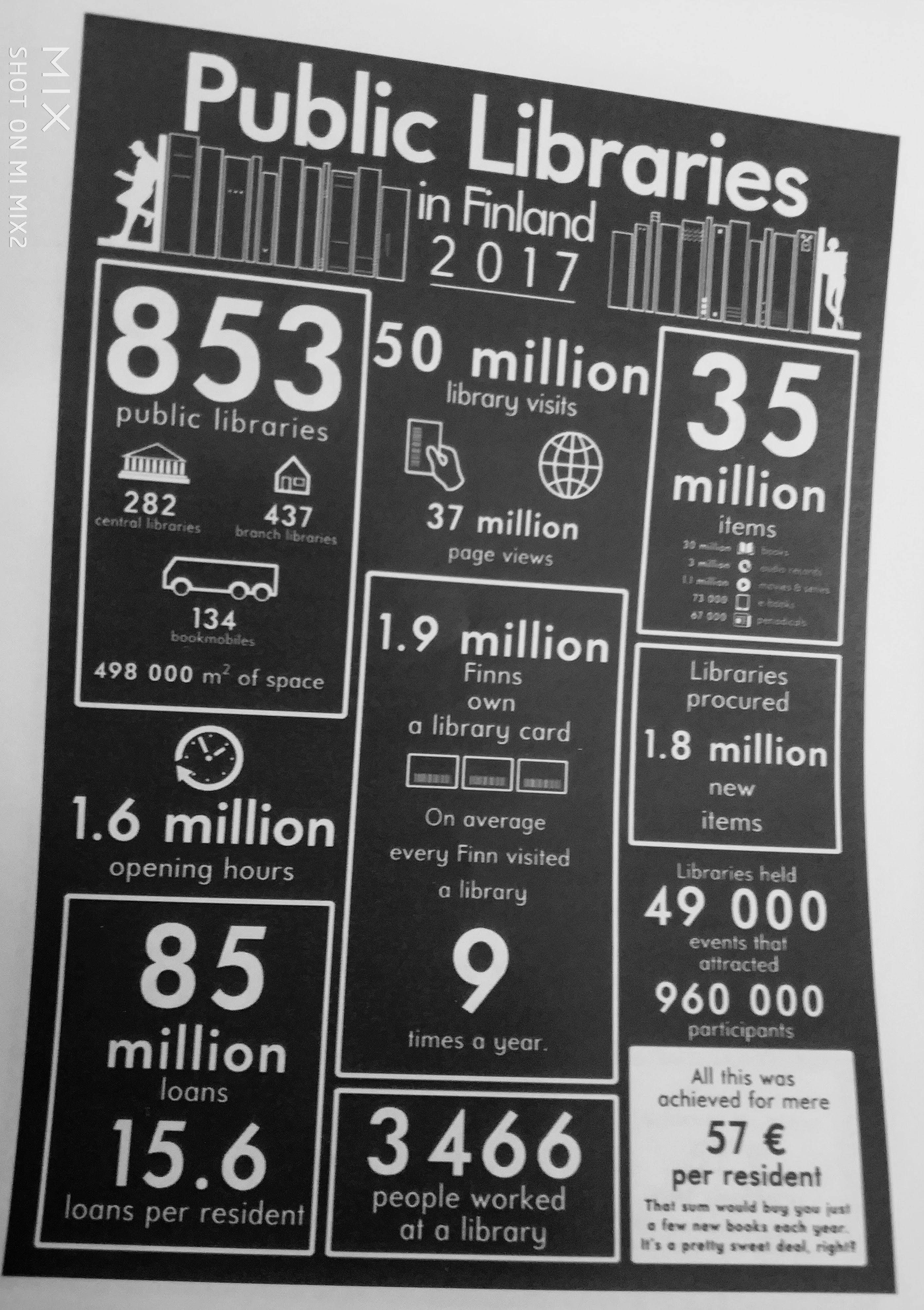the Finnish libraries- one essential social innovation on which the success of the Finnish education system may very well rest
How do you foster the success of education? How do you imagine a society in which education is no 1 “export” good? Here is one possible path: You foster learning for the love of learning; neuroscience supporting education research shows that building the self-image of the one that learns is essential in building deep learning ( flow) capacity. And this will be the basis for educating lifelong innovators and change-makers, but not least people that know how to make democratic decisions with respect to human rights ( as this stands at the core of the 2016 Finnish curriculum), feel good about life indifferent of their income or status, permanently questioning & being curious, starting different hobbies at any age.

This should not be accessible to the few but to the many which mean every school, every child, every teacher. If your perception is that knowledge, deep learning is something exclusive ( only a few teachers & students can access it in your context) this article might serve you, as well as the interview with Sanna Huttunen and visit to the best library in the world (awarded in 2020) – Oodi Library in Helsinki.
Allow learning to happen. Why reading? reading can be a container for you, allowing learning to happen, “ libraries are popular because they answer people’s individual needs. School and mass-media deliver ready-made chunks of information and life experience but the library system is better tuned into answering individual questions”. Says Kaarina Dromberg former Ministry of Culture ( 2002-2003) in 100 Social Innovation from Finland book. Whenever I spoke with librarians or teachers about how to foster “passion for reading” there was always guidance for the freedom of the readers– choosing books based on where they are right now, not where you want them to be. So it always starts with what do you like now? what are your interests?
Invite students to co-create the reading & free learning experience: In Oodi there are “guiding” robots that might take back books to the shelves or might guide you around the library. Children were asked to name them and the winners were traditional & well-known characters from the Finnish children’s literature. We got so many times questions about teenagers and Sanna will probably say a few words about how to encourage reading especially now during online learning. Librarians are specialists in Finland, they have BA degrees in library sciences so they are very well qualified advisors and will encourage literature appropriate to the age & context. Also, there is a very good system of electronic books. There are as well libraries specialized in supporting special education students and they hold special design books for example for students with ADHD or dyslexia.

Social learning. Libraries in Finland are a space of wellbeing and people learning to come& live together in a shared space, share books, and develop a common sense for that. Allow children to experience self-regulation, create reading & learning spaces that inspire both freedoms and also to know where the limits are (not affecting others’ freedom and wellbeing), where students can experience self-directed learning as well. Something very little like, not telling people not to eat while reading books from the library in the shared spaces, allow them to feel free as long as they protect the common good, and although there are millions of visitors, there are not so many cases of books being damaged ( according to Oodi staff).

Digitalization as a human right. In many articles from MIT, Harvard published we read “ we need a new narrative around digitalization. It might also be understood why in Finland the Library act which had a very long history was in the last years reviewed and a new version adopted to include digitalization as a human right. Libraries host maker spaces where children and any age citizen can access all devices & services (like 3D printing, vinyl cutter, digital drawing etc) for free. In Finland, you also talk & learn about netiquette since pre-school & have tablets& Chromebooks. If this sounds restrictive to you again like “only the few can afford”, ask how can you flip this image and include for your own mindset/perception, digitalization as a human right. In Finland as well there were so many schools receiving donations of older laptops from small local businesses as schools experienced lockdown during March-May 2020, and funds are limited.
Make it feel possible. I mentioned above the robots in the Oodi, the story behind it is that they were created by a teen that actually started his passion in a makerspace in a Helsinki library. Create in your teaching space for students to experience job-related skills, and as Jenni Sipola class teachers says might be a simple thing like asking for their help to make a video about your lesson, creating digital content, allow them to practice teaching you. It also goes hand in hand with a culture of hobbies and passions, children can be exposed to different possible talents, and then the teacher can follow up to see where their interests might be. We do not control the outcomes but rather allow the learning to happen, and systematically expose students to many and very diverse passions.

strollers’ parking 🙂 
shared living spaces for small children 
Outside environment 
families in videogames room 

maker-space area
Watch the interview with Sanna Huttunen
Resources:
- Picture with Oodi robots from https://towardsdatascience.com/the-little-robot-that-lived-at-the-library-90431f34ae2c
- Writing competition in Oodi https://www.oodihelsinki.fi/en/the-helsinki-city-library-writing-competition-is-concluded/
- 100 Social Innovations from Finland, you can access an electronic version of the book here
- Virtual Visit Oodi https://www.oodihelsinki.fi/en/visit-oodi-in-vr/
- Online services https://www.helmet.fi/en-US







1 thought on “Knowledge for the love of knowledge”
Great photos and spaces. Thank you very much. We always look for new ideas, models, and ways of learning. It’s so hard to change the mindset of how we teach and learn in 21. century.
Best, Zdenka Sušec